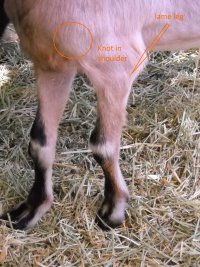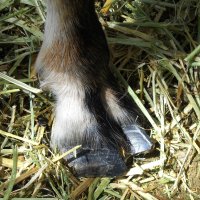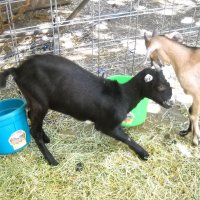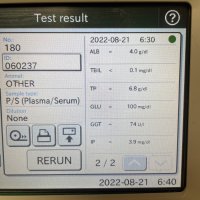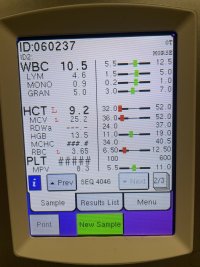lillyahoo
Exploring the pasture
- Joined
- Apr 14, 2022
- Messages
- 6
- Reaction score
- 2
- Points
- 16
So, sadly, I think I know what the outcome of this situation is going to be. But before I make that final decision, I'd like to throw this out to the forum to see if anyone has suggestions or input.
Background:
A friend of mine texted me from the farmer's market on April 14th to say there were two tiny baby goats (born April 1st & 4th) there that a commercial dairy was trying to give away. Knowing they would likely die in inexperienced hands, I agreed to take them. When they came, one had extremely swollen knees and shifting lameness, while the other had a wet cough, ears plugged shut with pus and a lump on the end of her nose.
By the end of the second week, I had a vet test the one with swollen knees for CAE and it came back positive. The next week, I took them both to the university large animal clinic here, which did an extensive eval and diagnosis. The one with swollen knees had joint ill, coccidiosis and lice, in addition to CAE. The other had trueperella pyogenes (the lump on her nose and likely also in her sinuses), enterococcus and lice. We embarked on a course of treatment for all, including penicillin, coccid treatment, ear medicine, etc. Their issues seemed to resolve, except for the CAE goat remaining intermittently lame.
Current problems:
The CAE goat (brown) has developed a large knot in his left shoulder, and uses that leg sparingly (mostly to hobble to the other side). He doesn't seem to be in pain, but now his right front foot seems to be growing wrong - his toes are splayed and they seem to be growing sideways (especially the right-most toe). I trim his feet regularly, but the soles of his feet aren't hitting the ground squarely any more due to the deformation, and he's walking on his heels/pastern too far back.
The trueperella goat (black) has had intermittent bouts of bloat ever since she came. Those seemed to be getting better until 2 weeks ago, when she had a bad case. I lifted her front feet, massaged her tummy until she burped several times and have treated her daily with probiotics and B vitamin paste since. She is eating, drinking, peeing and pooping normally, but she spends most of the day standing in the backwards-leaning position shown in the picture below and not moving around much. I did vaccinate and boost both of them for CD/T early on, but I haven't had any luck finding CD antitoxin to treat her. She also seems to be getting a bit lame on her left front leg and her pastern area might be a little swollen. I'm wondering if maybe she has CAE as well, but she hasn't been tested for it yet.
Any suggestions? I plan to take them back to the university vet clinic next week, but I'm wondering if there is anything else I can try in the meantime. Or is the consensus to put them down, which is what I expect the clinic to recommend? They are very sweet and tame, but I don't want them to suffer.
Background:
A friend of mine texted me from the farmer's market on April 14th to say there were two tiny baby goats (born April 1st & 4th) there that a commercial dairy was trying to give away. Knowing they would likely die in inexperienced hands, I agreed to take them. When they came, one had extremely swollen knees and shifting lameness, while the other had a wet cough, ears plugged shut with pus and a lump on the end of her nose.
By the end of the second week, I had a vet test the one with swollen knees for CAE and it came back positive. The next week, I took them both to the university large animal clinic here, which did an extensive eval and diagnosis. The one with swollen knees had joint ill, coccidiosis and lice, in addition to CAE. The other had trueperella pyogenes (the lump on her nose and likely also in her sinuses), enterococcus and lice. We embarked on a course of treatment for all, including penicillin, coccid treatment, ear medicine, etc. Their issues seemed to resolve, except for the CAE goat remaining intermittently lame.
Current problems:
The CAE goat (brown) has developed a large knot in his left shoulder, and uses that leg sparingly (mostly to hobble to the other side). He doesn't seem to be in pain, but now his right front foot seems to be growing wrong - his toes are splayed and they seem to be growing sideways (especially the right-most toe). I trim his feet regularly, but the soles of his feet aren't hitting the ground squarely any more due to the deformation, and he's walking on his heels/pastern too far back.
The trueperella goat (black) has had intermittent bouts of bloat ever since she came. Those seemed to be getting better until 2 weeks ago, when she had a bad case. I lifted her front feet, massaged her tummy until she burped several times and have treated her daily with probiotics and B vitamin paste since. She is eating, drinking, peeing and pooping normally, but she spends most of the day standing in the backwards-leaning position shown in the picture below and not moving around much. I did vaccinate and boost both of them for CD/T early on, but I haven't had any luck finding CD antitoxin to treat her. She also seems to be getting a bit lame on her left front leg and her pastern area might be a little swollen. I'm wondering if maybe she has CAE as well, but she hasn't been tested for it yet.
Any suggestions? I plan to take them back to the university vet clinic next week, but I'm wondering if there is anything else I can try in the meantime. Or is the consensus to put them down, which is what I expect the clinic to recommend? They are very sweet and tame, but I don't want them to suffer.
Attachments
Last edited:


